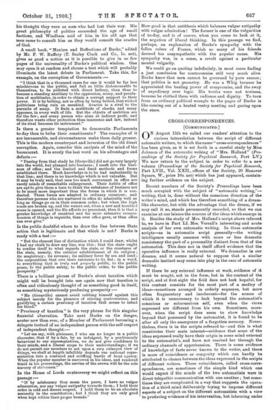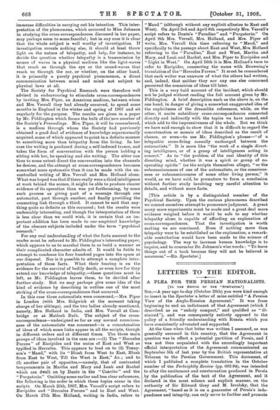CROSS-CORRESPONDENCES.
[COMMUNICATED.] ON August 15th we called our readers' attention to the curious interrelation between the script of different automatic writers, to which the name " cross-correspondences" has been given, as it is set forth in a careful study by Miss Johnson of the automatic writing of "Mrs. Holland" (Pro- ceedings of the Society for Psychical Research, Part LV.) We now return to the subject in order to refer to a new volume (Proceedings of the Society for Psychical Research, Part LVII., Vol. XXII., offices of the Society, 20 Hanover Square, W., price 10s. net) which has just appeared, contain- ing further evidence on the subject.
Recent numbers of the Society's Proceedings have been much occupied with the subject of "automatic writing,"— writing, that is, done without the conscious direction of the writer's mind, and which has therefore something of a dream- like character, but with the advantage that the dream, if we may call it so, stands permanently recorded, so that we can examine at our leisure the sources of the ideas which emerge in it. Besides the study of Mrs. Holland's script above referred to, we have in Part LI. Mrs. Verralrs interesting and acute analysis of her own automatic writing. In these automatio scripts—as in automatic script generally—the writing intelligence usually assumes with more or less dramatic consistency the part of a personality distinct from that of the automatist. This does not in itself afford evidence that the operative influence is really external. We dramatise in our dreams, and it seems natural to suppose that a similar dramatic instinct may come into play in the case of automatic writing.
If there be any external influence at work, evidence of it must be sought, not in the form, but in the content of the script, and at first sight the field does not look hopeful, for this content consists for the most part of a medley of ideas—sometimes arranged in orderly sequence, but more often fragmentary and incoherent—for the source of which it is unnecessary to look beyond the automatist's conscious or subconscious self, even when the views expressed are different from his own. Sometimes, more- over, when the script does seem to show knowledge beyond that possessed by the automatist, it is found to be after all only the emergence of a forgotten memory. Never- theless, there is in the scripts referred to—and this is what constitutes their main interest—evidence that some of the ideas expressed really have their origin in some mind external to the automatist's, and have not reached her through the ordinary channels of apprehension. There is some evidence of knowledge of facts never known to the writer, and there is more of coincidence or congruity which can hardly he attributed to chance between the ideas expressed in the scripts of different writers. These coincidences, called cross-corre- spondences, are sometimes of the simple kind which one would expect if the minds of the two automatiste were in direct telepathic communication with one another ; but some- times they are complicated in a way that suggests the opera- tion of a third mind deliberately trying to impress different aspects of a subject on the different automatiste with a view to producing evidence of his intervention, but labouring under
immense difficulties in carrying out his intention. This inter- pretation of the phenomena, which occurred to Miss Johnson in studying the cross-correspondences discussed in her paper, may perhaps seem to some fanciful ; but in any case it is clear that the whole subject is well worthy of investigation. If investigation reveals nothing else, it should at least throw light on the nature of telepathy, and help, for instance, to decide the question whether telepathy is a transmission by means of waves in a physical medium like the light-waves that reach us through the eye or the sound-waves that reach us through the ear, or whether, on the other hand, it is primarily a purely psychical phenomenon, a direct communication between mind and mind not subject to physical laws at all.
The Society for Psychical Research were therefore well advised in endeavouring to stimulate cross-correspondences by inviting Mrs. Piper, an American medium, between whom and Mrs. Verrall they had already occurred, to spend some months in England in the winter and spring of 1907 and sit regularly for the purpose. The results are given in a paper by Mr. Piddington which forms the bulk of the:new number of the Society's Proceedings. Mrs. Piper, it will be remembered, is a medium through whom the Society had previously obtained a good deal of evidence of knowledge supernormally acquired, some of which appeared to point in a definite manner to something more than telepathy from the living. In her case the writing is produced during a self-induced trance, and takes the form of conversation with the person holding a sitting with her, be speaking and she writing. The sitter can thus to some extent direct the conversation into the channels he desires, and the attempt at cross-correspondences becomes somewhat more systematic than it can be made with the un- controlled writing of Mrs. Verrall and Mrs. Holland alone. What was hoped was that if there really were a third intelligence at work behind the scenes, it might be able to produce clearer evidence of its operation than was yet forthcoming, by some such process ' as giving part of a message through one automatist, part through another, and finally providing the connecting link through a third. It cannot be said that any- thing quite so definite as this occurred ; but the results were :undeniably interesting, and though the interpretation of them is less clear than we could wish, it is certain that an im- portant addition has been made to our empirical knowledge of the obscure subjects included under the term "psychical research."
For any real understanding of what the facts amount to the reader must be referred to Mr. Piddington's interesting paper, which appears to us to marshal them in as luoid a manner as their complicated character admits of. It would be futile to attempt to condense his four hundred pages into the space at our disposal. Nor is it possible to attempt a complete inter- pretation. of these facts. What their bearing is on the evidence for the survival of bodily death, or even how far they extend our knowledge of telepathy,—these questions must be left, as Mr. Piddington leaves them, to be decided after further study. But we may perhaps give some idea of the kind of evidence by describing in outline one of the most striking of the cross-correspondences that occurred.
In this case three automatists were concerned,—Mrs. Piper in London (with Mrs. Sidgwick at the moment taking charge of her sittings), and the two ladies already mentioned, namely, Mrs. Holland in India, and Mrs. Verrall at Cam- bridge or at Matlock Bath. The subject of the cross- correspondence—undesigned so far as any normal conscious- ness of the automatists was concerned—is a concatenation of ideas of which some links appear in all the scripts, though in different orders and at different times. The three main groups of ideas involved in the case are :—(1) The "Hercules Furens " of Euripides and the union of East and West as typified in Hercules. This appears to lead on to (2) Tenny- son's "Maud," with its "Blush from West to East, Blush from East to West, Till the West is East," &c. ; and to (3) another pair of opposites,—namely, that of contrasted temperaments in Martha and Mary and. Leah and Rachel which are, dwelt on by Dante in the " Convito."- and the " Purgatorio." Omitting some earlier and less clear references, the following is the order in which these topics occur in the scripts. On March 25th, 1907, Mrs. Veil-airs script refers to Euripides and "Hercules Furens " and to East and West. On .March 27th Mrs. Holland, writing in India, refers to
"Maud" (although without any explicit allusion to East and West). On April 3rd and April 6th respectively Mrs. Verralrs script refers to Dante's "Paradiso" and "Purgatorio." On April 8th Mrs. Verrall, Mrs. Holland, and Mrs. Piper all write, Mrs. Verrall this time referring to "Maud," and specifically to the passage about East and West, Mrs. Holland referring to the " Paradiso," East and West, Martha and Mary, and Leah and Rachel, and Mrs. Piper to Euripides and "Light in West." On April 16th it is Mrs. Holland's turn to refer to Euripides, connecting the name with Browning's translation of the " Hercules F arena." It must be remembered that each writer was unaware of what the others had written, and, indeed, that neither they nor any one else concerned perceived the connexion of ideas till later.
This is a very bald account of the incident, which should not be judged without reading the full account given by Mr. Piddington. A brief description such as the above is, on the one hand, in danger of giving a somewhat exaggerated idea of the explicitness of the dreamlike references, while, on the other, it omits subsidiary cross-correspondences connected directly and indirectly with the topics we have named, and which add to the impressiveness of the whole. But we think we have said enough to show that it is difficult to regard the concatenation or mosaic of ideas described as the result of chance, or even—to use Mr. Piddington's phrase—" of a telepathic cross-firing casually • exchanged between the automatists." It is more like "the work of a single direct- ing intelligence, or of a group of intelligences acting in concert." As to "the problem of the real identity of this directing mind, whether it was a spirit or group of co- operating spirits" (as the scripts themselves allege), "or the subconsciousness of one of the automatists, or the conscious- ness or subconsciousness of some other living person," it would, as we have said, be premature to form a conclusion without further study involving very careful attention to details, and without more facts.
[This article is by a distinguished member of the Psychical Society. Upon the curious phenomena described we cannot ourselves attempt to pronounce judgment. A great many more experiments must be made and a great deal more evidence weighed before it would be safe to say whether telepathy alone is capable of affording an explanation of cross-correspondences. That the investigation is worth making we are convinced. Even if nothing more than telepathy were to be established as the explanation, a remark- able contribution would have been made to the science of psychology. The way to increase human knowledge is to inquire, and to remember Dr. Johnson's wise words : "To leave things out of a book because they will not be believed is meanness."—En. Spectator.]















































 Previous page
Previous page